Contents
Blackberry Agawam is a plant that has mixed reviews from gardeners. Some, because of the numerous advantages, are seriously passionate about the berry. Others avoid growing it for various reasons. Before drawing your own conclusions, it is worth getting to know the species better.
Characteristics of a variety
The variety has small fruits, the weight of its berries is usually about 4 grams. Their color is black with a characteristic sheen. Before the onset of full ripeness, the taste of blackberries is grassy with acid. However, when the fruits ripen, sweetness is characteristic, and at the same time, blackberries become smaller and practically impossible to transport. The yield of the variety is high and constant. It is about 10 kilograms per bush. You can collect the first fruits in August or the very beginning of autumn.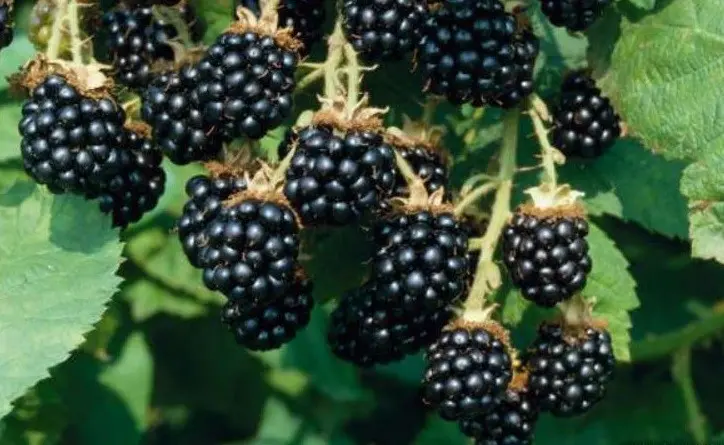
Blackberry Agawam grows as a bush, which is formed by thorny branches. That is, they are covered with thorns. The height of individuals usually does not exceed 2 meters. The spines are large, slightly curved. It is because of them that caring for the berry is not easy. To facilitate the procedure, it is worthwhile to form a bush with a small number of stems in advance, to carry out systematic pruning so that the plant does not become too thick.
The description of the variety notes the high resistance of the plant to low temperatures. Young shoots are able to survive even -30 °. This feature distinguishes the variety from its own kind. Such blackberries can be grown even in the northern regions, and without insulation or shelter, while hoping for a rich harvest. In addition, the variety is not very susceptible to ailments, and parasites rarely attack it.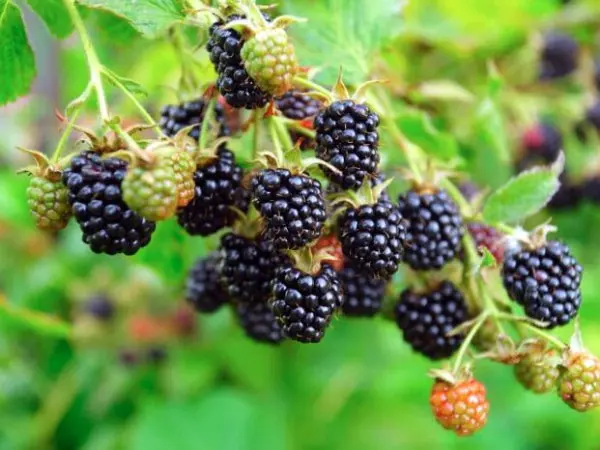
In addition, the culture is also able to survive drought well, grow in the shade without changing the size and taste of fruits, and actively bear fruit. Also, the berries are applicable for different purposes, and if they are not fully ripe, they can even be successfully transported.
The main disadvantage of the plant is the large number of thorns on its branches, which complicates care.
Video “Features of the Agawam variety”
From the video you will learn about the features of this blackberry variety.
Cultivation
The planting of the variety should be carried out in the spring, because the individuals planted at this time will have time to take root well in the ground. When planting in the autumn, young crops should not be placed in the hole, but put and covered with a layer of soil on top. Otherwise, still weak plants can die from frost.
Planting will give the desired results if it is done in sandy soil, which has a neutral environment. If the earth is acidified, it will need to be limed. For the procedure, it is better to opt for a well-lit area. The bush tolerates shade well, but growing it in the sun will give a greater effect. With shade cultivation in the northern parts of the country, annual stems may not mature before winter.
Before planting is made, it is worth adding mullein to the hole, filling everything with humus and adding a mixture of superphosphate and potassium supplements. After that, it is worth filling everything with humus in half of the pit and watering. Landing, which is carried out in such a hole, provides food for the individuals for the next 3 years. After that, the bush must be sealed with compost or manure.
The description of the process of growing a variety says that after planting, young individuals must be cut so that they rise no more than 0,2 – 0,25 meters above the earth’s surface. The area around the trunk should be mulched. This procedure will help to keep water in the ground and reliably protect the plant from weeds. The best mulch for blackberries is needles and tree bark.
Planting a variety berry can be done in 2 main ways: in rows or in bushes. If you do not seek to create a blackberry plantation, you must leave an area of 2 by 2 meters for each bush. As for growing in rows, the scheme is more complicated.
It is worth leaving a meter from the edge of the site and planting individuals at the same distance from each other.
At the beginning and end of the row, powerful, elastic racks are dug in, between which the wire is pulled three times: at a height of 0,4, 1,2 and 1,7 meters.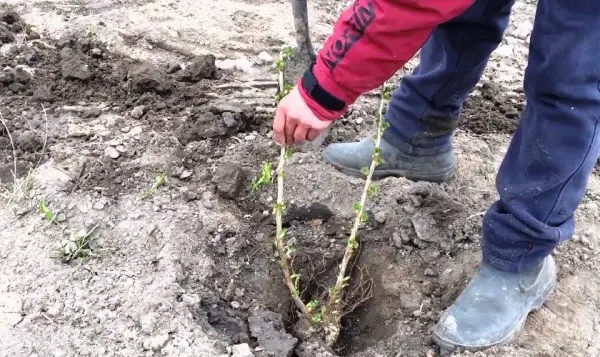
Thus, a trellis is formed, which simplifies the growth of culture and care for it. In summer, seedlings are fixed on the upper and middle wire with a distance of 0,25 meters. In this case, the vine will be able to get enough sun. In addition, the harvesting process will be greatly simplified, as well as crop care. In addition, this procedure contributes to the creation of a prickly green “fence”.
Care also includes pruning of the shoots of the variety. In autumn, it is worth cutting off all the stems at the age of 2 years. Young ones must be tied in a bundle, bent to the bottom wire and tied up. It is necessary to carry out the procedure before the onset of cold weather, until the shoots are stiff and still able to bend.
The variety can survive the winter without warming it. In severe frosts, snow can be poured onto the bush.
If you are worried that the plant is not able to overwinter, it is worth organizing a shelter shield for the berry. Boards of boards are installed over the bushes and turned into a hut (covered with a film). At the ends, the structure closes after the onset of active frosts.
Trimming
Care for individuals of the variety in the first years, as the description says, is simple. During this period, it is not yet necessary to form a bush of culture. However, after some time, the culture begins to grow actively. Its vines become much longer and may well form impenetrable thickets. Therefore, starting from the 4th year of life, the variety needs a regular “haircut”.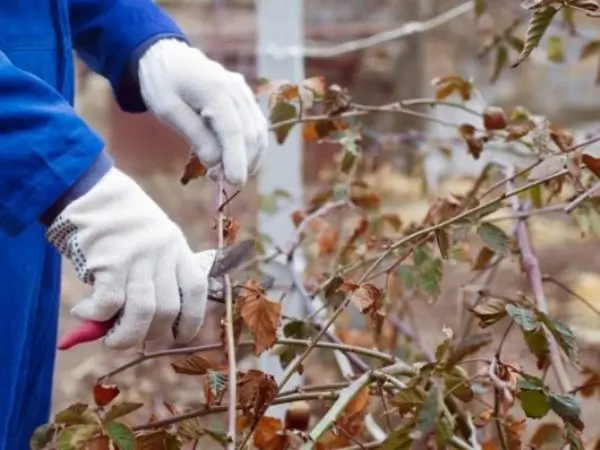
If you do not take into account the autumn pruning, then the variety is sheared 2 times a season. For the first time, extra organs are removed in the spring. After winter, the vine is subject to mandatory inspection. Live shoots have a brown color, they are strong and resilient. In order to harvest a rich harvest, you can leave up to 6 shoots on a variety bush.
The next pruning, which provides for the care of the plant, is carried out in July on the shoots of this year. It is carried out in the form of pinching the top by 0,1 meters. Thanks to the procedure, the variety will actively bear fruit next year.
Diseases and pests
The variety is resistant to diseases and pest attacks. However, if the care of the plant is not organized correctly, the culture may suffer from infectious diseases. Most often, they occur with improper dressing of the variety. If a variety experiences a deficiency or excess of any element, it may experience a number of unpleasant symptoms.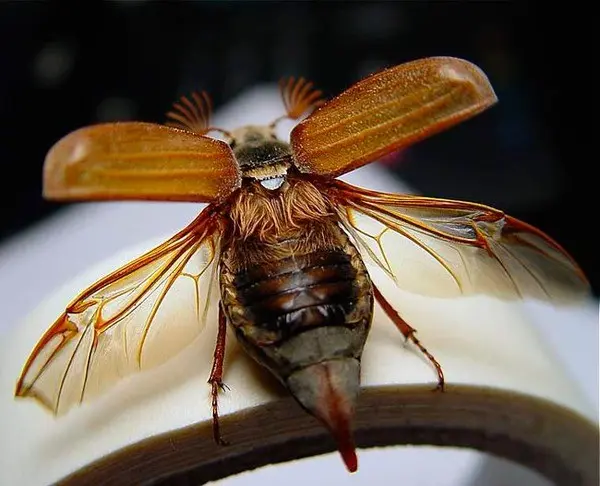
The variety may suffer from the attacks of the bear, the May beetle. Plants such as marigolds and marigolds will help scare away the parasite. The roots of crops contain many essential oils that pests are afraid of.
Caring for Agaves is no more difficult than caring for raspberries. Rich quality crops more than compensate for all the inconveniences associated with agricultural technology.
Video “Growing blackberries”
From the video you will learn how to grow blackberries, what you need to do when leaving.









